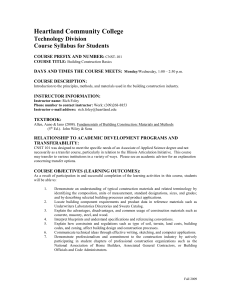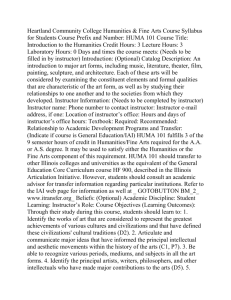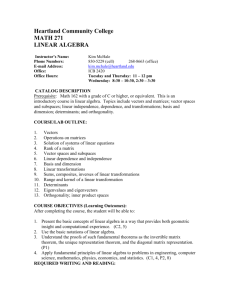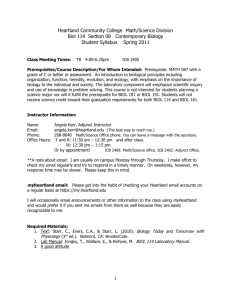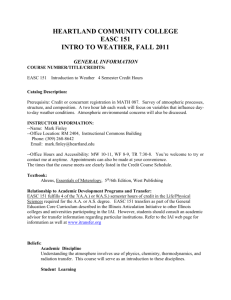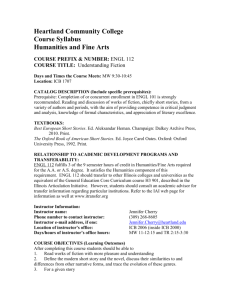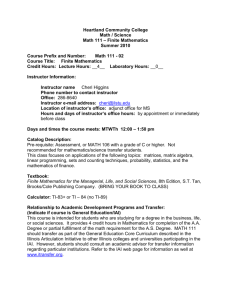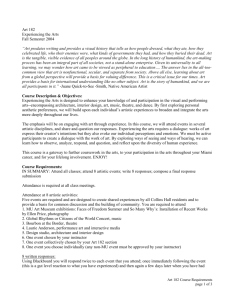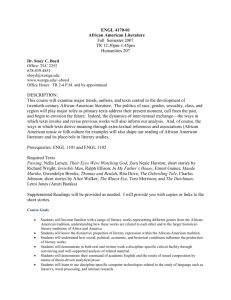ENGL 111 Rankin - Heartland Community College
advertisement
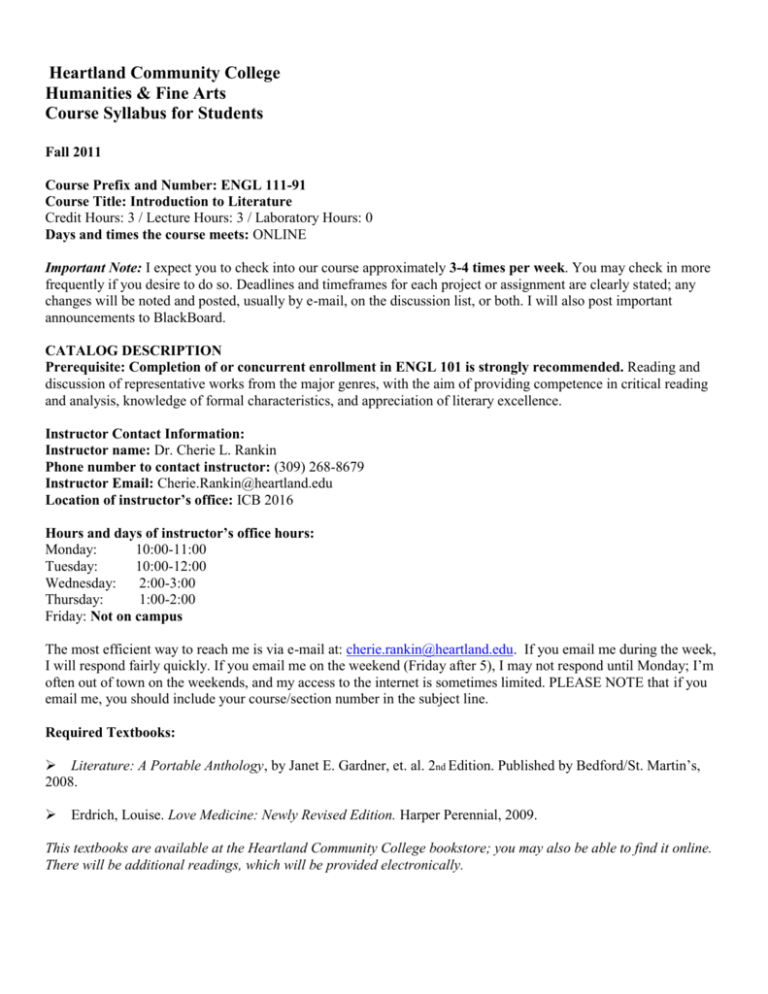
Heartland Community College Humanities & Fine Arts Course Syllabus for Students Fall 2011 Course Prefix and Number: ENGL 111-91 Course Title: Introduction to Literature Credit Hours: 3 / Lecture Hours: 3 / Laboratory Hours: 0 Days and times the course meets: ONLINE Important Note: I expect you to check into our course approximately 3-4 times per week. You may check in more frequently if you desire to do so. Deadlines and timeframes for each project or assignment are clearly stated; any changes will be noted and posted, usually by e-mail, on the discussion list, or both. I will also post important announcements to BlackBoard. CATALOG DESCRIPTION Prerequisite: Completion of or concurrent enrollment in ENGL 101 is strongly recommended. Reading and discussion of representative works from the major genres, with the aim of providing competence in critical reading and analysis, knowledge of formal characteristics, and appreciation of literary excellence. Instructor Contact Information: Instructor name: Dr. Cherie L. Rankin Phone number to contact instructor: (309) 268-8679 Instructor Email: Cherie.Rankin@heartland.edu Location of instructor’s office: ICB 2016 Hours and days of instructor’s office hours: Monday: 10:00-11:00 Tuesday: 10:00-12:00 Wednesday: 2:00-3:00 Thursday: 1:00-2:00 Friday: Not on campus The most efficient way to reach me is via e-mail at: cherie.rankin@heartland.edu. If you email me during the week, I will respond fairly quickly. If you email me on the weekend (Friday after 5), I may not respond until Monday; I’m often out of town on the weekends, and my access to the internet is sometimes limited. PLEASE NOTE that if you email me, you should include your course/section number in the subject line. Required Textbooks: Literature: A Portable Anthology, by Janet E. Gardner, et. al. 2nd Edition. Published by Bedford/St. Martin’s, 2008. Erdrich, Louise. Love Medicine: Newly Revised Edition. Harper Perennial, 2009. This textbooks are available at the Heartland Community College bookstore; you may also be able to find it online. There will be additional readings, which will be provided electronically. Relationship to Academic Development Programs and Transfer: (Indicate if course is General Education/IAI) ENGL 111 fulfills 3 of the 9 semester hours of credit in Humanities/Fine Arts required for the A.A. or A.S. degree. It satisfies the Humanities component of this requirement. ENGL 111 should transfer to other Illinois colleges and universities as the equivalent of the General Education Core Curriculum course H3 900, described in the Illinois Articulation Initiative. However, students should consult an academic advisor for transfer information regarding particular institutions. COURSE OBJECTIVES (LEARNING OUTCOMES): After completing this course students should be able to: 1. Read literary works with more pleasure and understanding. 2. Identify some of the major differences among fiction, poetry, drama, and non-fiction prose, and the qualities intrinsic to each. 3. Identify significant questions and ideas dealt with by literary authors, and describe how literature goes about trying to answer them. 4. Define key literary terms such as sonnet, metaphor, and iamb. 5. Evaluate some of the ways that readers read literary texts. 6. Relate literature to your own experience and to the world around you. 7. Set forth a coherent, focused, and well developed discussion in writing. Approximate Course/Lab Outlines: Weeks 1-8: The Novel: Erdrich’s Love Medicine Weeks 9-11: Selected Short Fiction Weeks 12-14: Selected Poetry Weeks 15-16: Drama Classes end on December 9th. Finals Week begins on December 12th. MAJOR PROJECTS: Assignment sheets with more detail and explanation will be made available in BlackBoard as we get close to each project. These will be available in the “Course Information” link on the course BlackBoard page. Weekly Discussion Posts: 150 points (15 weeks X 10 points each; no post in week 16). Posting to the discussion list is a major portion of your participation of the course. You cannot pass the course without meeting this expectation. Discussion questions will be posted for each week. You are expected to post initial responses to the questions by Wednesday evenings at 10 PM. You are then expected to interact with your classmates by responding to their posts throughout the rest of the week. Respond to at least two of your classmates’ posts by Sunday night at 10 PM. NOTE: Your posts and responses should be thoughtful and meaningful. This does not mean they have to be long—you can say a lot in a short paragraph. But they should reflect that you are engaging with the material and with your classmates’ observations. Weekly Reading Journals: 150 points (15 weeks X 10 points each; no post in week 16). Each week you will be expected to produce approximately 250 words (one double-spaced page in normal-sized font) of response to that week’s reading. You may approach this from any angle you like, though pointing out and working through contradictions or difficulties you’re finding in the text would be a good starting point. These journal entries should show engagement with the text, and should move beyond why did or did not “like” a particular text. Unit Papers 120 points (4 papers @ 30 points each). You will write a short paper (2 pages) at the end of each literary unit. These papers will evaluate your knowledge of major terms and concepts, as well as ask you to apply these terms and concepts to various texts we have read. You will receive a more detailed writing assignment for each unit, at the beginning of each unit. Midterm Exam: 100 points – This is an essay exam addressing topics covered in the first half of the course. You will be asked to apply specific terms and concepts to one or more texts. The exam questions will be posted a week before the essay is due. You will submit this document to me as a Word file using the “Assignment Submission” link in BlackBoard. Final Exam: 100 points– This is an essay exam addressing topics covered in the second half of the course. You will be asked to apply specific terms and concepts to one or more texts. The exam question will be posted a week before the essay is due. You will submit this document to me as a Word file using the “Assignment Submission” link in BlackBoard. Extended Analysis of a Text (100 points) – This is a 6-page essay, with at least 3 solid, credible, academic sources (not including the primary text—the text you are writing about). You will select one assigned text (short fiction, poetry or drama) from our anthology on which to perform an extended literary analysis. You will be asked to apply one or more literary perspectives (theories) and utilize relevant literary terms as part of your analysis. Note: This essay must utilize complete and correct MLA format, including a Works Cited page. You will submit this document to me as a Word file using the “Assignment Submission” link in BlackBoard. SEMESTER TOTAL: 720 points Method of Evaluation (Tests/Exams, Grading System) Final grades will be determined according to the following scale: 92- 100% = A 83 - 91% = B 74 - 82% = C 65 - 73% = D Below 65% = F IMPORTANT COURSE POLICIES NOTE: This is an online course, but it works in a scheduled, time-dependent way similar to a class in a traditional format. That is, while some online courses at other schools are “work at your own pace,” this one is not. You are expected to stay on top of due dates posted in the Course Calendar and the Assignment Submission link, and to turn things in on time. Technology: You are responsible for navigating the technology needed for this course and keeping your myHeartland Portal password in working order. You are expected to have reliable access to the internet, and to have Microsoft Word on your computer. All three Heartland Community College campuses provide free access to the internet and to all necessary word processing programs. You are responsible for learning to use BlackBoard technology to complete assignments, quizzes, and exams. In order to prevent any technical difficulties when taking quizzes for our course, you should participate in the selfguided online (BlackBoard) orientation modules offered by the college. Familiarity with BlackBoard should eliminate most technical problems you otherwise might encounter. Additionally, please use the “Tech Support” link on our web site if you have specific technology questions or problems. NOTE: Many “issues” people have with BlackBoard are because of incompatibilities with Internet Explorer. Usually, using another browser will solve these issues. I recommend Mozilla Firefox, which you can download from the internet for free. NOTE: Not being familiar with and functional in the BlackBoard technology will not be an acceptable excuse for late work. If you use a type of word processing software other than Microsoft Word for Windows, you will need to save your documents as rich text files (RTF). Otherwise, I may not be able to open the documents. If you have any questions about how to do this, please ask. Participation: Full online participation is required to pass this course. I expect that you will sign in to the course 3-4 times weekly in order to complete discussion and other assignments. Full participation includes timely participation on the discussion list. Students are expected to complete all assignments. If at any time you are confused about an assignment or due date, please email the instructor as soon as possible. Incompletes: Incompletes will not be granted at the end of the semester unless you have been making satisfactory progress all along. If this is the case, and you have extenuating circumstances at the end of the semester that necessitate an incomplete, we will discuss this on a case-by-case basis. Make-up of tests and assignments: Tests and papers are scheduled well in advance and are posted on the course calendar. Therefore, things should be turned in on time, when they are due. Any exception to this rule would be made after careful consultation between the student and the instructor, again on a case-by-case basis. Deadlines: All deadlines must be met. I reserve the right not to accept late assignments. If you are having difficulty with a particular assignment, please contact me for assistance well ahead of the deadline. I am happy to help. Midterm Grades and Midterm Withdrawal: If you are not regularly participating in online discussion and submitting the majority of your work, you will be dropped from the course at midterm per college policy. This is not negotiable, as it is an ethical breach for the college to collect state funds for students who are not making satisfactory progress at midterm. Once you have been withdrawn at midterm, you will not be reinstated. Required Writing and Reading: There will be 12-15 pages of formal writing and additional informal writings. The readings will consist of one novel, and selected poems, short stories, and plays. There will also be additional reading which addresses the different genres of writing and different theoretical approaches to literature. Reading will consist of approximately 50 pages per week, though this is a rough estimate. ACADEMIC INTEGRITY AND PLAGIARISM Academic Integrity Academic integrity is a fundamental principle of collegial life at Heartland Community College and is essential to the credibility of the College’s educational programs. Moreover, because grading may be competitive, students who misrepresent their academic work violate the right of their fellow students. The College, therefore, views any act of academic dishonest as a serious offense requiring disciplinary measures, including course failure, suspension, and even expulsion from the College. In addition, an act of academic dishonesty may have unforeseen effects far beyond any officially imposed penalties. Violations of academic integrity include, but are not limited to cheating, aiding or suborning cheating or other acts of academic dishonesty, plagiarism, misrepresentation of data, falsification of academic records or documents and unauthorized access to computerized academic or administrative records or systems. Definitions of these violations may be found in the college catalog. Plagiarism Plagiarism is the presenting of others’ ideas as if they were your own. When you write a paper, create a project, do a presentation or create anything original, it is assumed that all the work, except for that which is attributed to another author or creator, is your own. Plagiarism is considered a serious academic offense and may take the following forms: 1 Copying word-for-word from another source and not giving that source credit. 2 Paraphrasing the work of another and not giving that source credit. 3 Adopting a particularly apt phrase as your own. 4 Using an image or a copy of an image without crediting its source. 5 Paraphrasing someone else’s line of thinking in the development of a topic as if it were your own. 6 Receiving excessive help from a friend or elsewhere, or using another project as if it were your own. Note that word-for-word copying is not the only form of plagiarism. The penalties for plagiarism may be severe, ranging from failure on the particular piece of work, failure in the course or expulsion from school in extreme cases. [Adapted from the Modern Language Association’s MLA Handbook for Writers of Research Papers. New York: MLA, 1995: 26] Academic Support Center Services: Library The Library, located in the Student Commons Buildings at the Raab Road campus, provides Heartland students with a full range of resources including books, online journal databases, videos, newspapers, periodicals, reserves, and interlibrary loan. Librarians are available to assist in locating information. For more information, please call the Library (309) 268-8200 or (309) 268-8292 Tutoring Services Heartland Community College offers tutoring in various forms at no cost to Heartland students at the Tutoring and Testing Center in Normal and at the Pontiac and Lincoln Centers. Tutors are available at convenient times throughout the week. Study groups are also available by request. For more information about services available at each location, please call the Tutoring Center in Normal (309) at 268-8231, the Pontiac Center at (815) 842-6777, or the Lincoln Center at (217) 735-1731. Writing Lab: The Writing Lab is now part of Tutoring, and is open to all HCC students working on their writing. HCC writing faculty help students apply course outcomes to their papers. Visit the Tutoring Center or call the TTC for an appointment: 268-8231. Testing Services The Tutoring and Testing Center provides a secure testing environment for students who are enrolled in online, hybrid, and other distance learning courses; have a documented disability; or need to take a make-up exam. Testing accommodations for students having documented disabilities must be arranged by the student through the Office of Disability Services, and Testing Services will only administer make-up exams at the request of the instructor. Contact Testing Services at (309) 268-8231 for more information. Open Computing Lab The Open Computing Lab provides free computing for HCC students at convenient times throughout the week. The computer lab is staffed by trained Lab Assistants and offers the use of approximately 70 computers, a scanner, a laser printer, and an electric typewriter. Disability Support Services Heartland Community College offers Disability Support Services (DSS) with offices located in the Academic Support Center. DSS ensures that students with disabilities have equal access to the college’s programs, services and activities through the provision of reasonable accommodations as outlined in Section 504 of the Rehabilitation Act and the Americans with Disabilities Act. DSS offers a wide range of services to support students with disabilities, including: assistive technology, document conversion services, personnel, classroom and testing accommodations.
